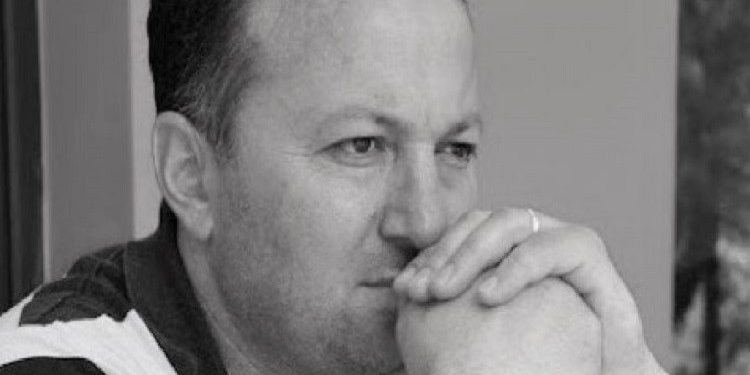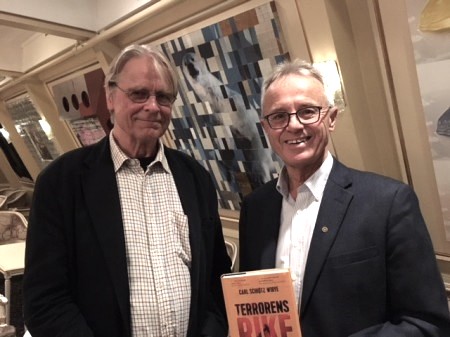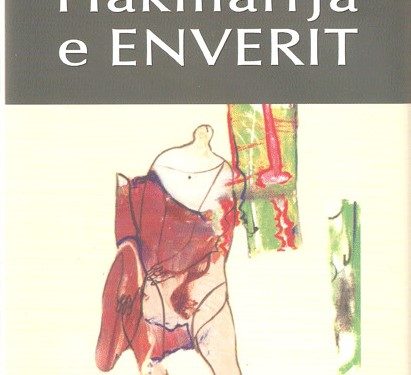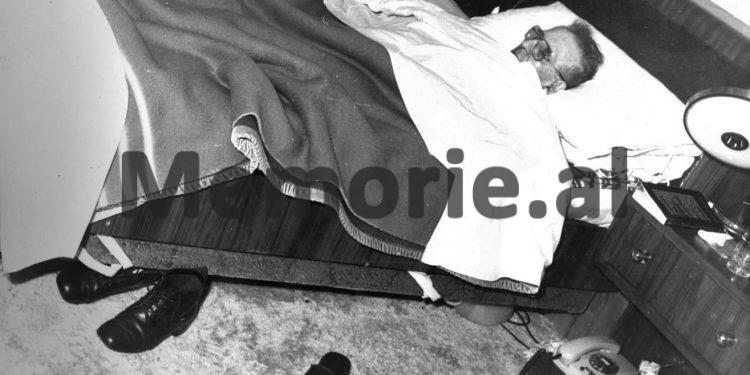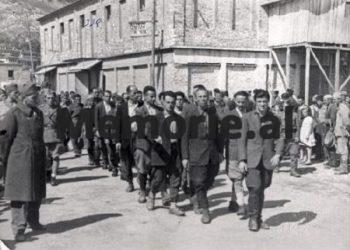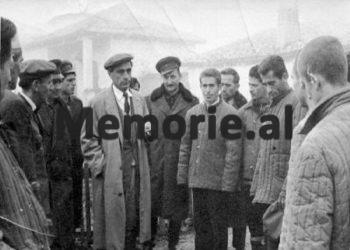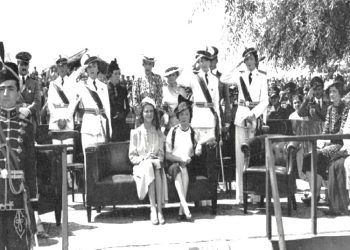By Ferdinand Dervish
Memorie.al / “Albanians moved to Kosovo after 1389, they needed land…”! He is the official representative of the Norwegian people in Albania, the man who brings back to attention this Serbian version, which was also used as a historical argument to justify Milosevic’s massacres in Kosovo, during the war of 1998-’99. The author’s name is Carl S. Wibye, he has the attributes of the Norwegian ambassador in Skopje and Tirana, while the above phrase, which is not alone in the venom it carries, has found a place in the pages of his book; “Enver’s Revenge”, first published in Norway in 1994 and then published and promoted in Tirana.
Through this paper, the Norwegian Wibye tries to present an overview of Albania during the dictatorship and the years before and after 1990. An attempted panorama, but little similar to reality, or more precisely similar to extremes raised in fantasy. Extremities that reduce to infinity all moral values, and not only, cultivated for centuries by Albanians. Mr. Wibye seems to have written this book under the strong influence of anti-Albanian propaganda, made by extreme Serbian nationalism, probably introduced into his mind, from the time he served in Yugoslavia, before 1990.
The book was originally published in Oslo in 1994, and there is no online record, either in Norwegian, of whether or not its content has been critically acclaimed. Or worse it can be assumed that; criticism has noticed, but has overlooked the debate, because of the anti-Albanian spirit of the book. A hypothetically arrived at conclusion, if it is brought to your attention that Norwegian criticism, a pro-Albanian novel, written by another Norwegian, Kjell Hoibraaten, with the title; “Aleksandra, an Albanian story”, published in Norway in 2004, has been attacked by the criticism of this country for “strong pro-Albanianism”.
Book
More or less, the subject of the novel “Enver’s Revenge” is centered on an Albanian-Norwegian named Simon Murra, who receives a tempting offer from the Albanian communist leaders to help extract oil. He comes to Albania where he connects with a clan close to Prime Minister Mehmet Shehu, which is clearly decided, with his ideas, against Enver Hoxha. Murra, assists in the murder of Mehmet Shehu, which according to the author of the book, happened not in his apartment and bed, but in a meeting room in the Central Committee.
According to this version, the former prime minister was shot and killed by Enver Hoxha’s guards, in an exchange of fire, at the moment he pulled a pistol from his belt and aimed at the communist leader of the country. While the second part of the novel again gives a distorted panorama of post-communist Albania, where the main character takes on the role of a gold trafficker, breaking all the roadblocks up to Macedonia with the trunk of his car. In the end, the main character is killed, by unknown people in Norway, it seems to justify the title of the book. This is more or less the content, in bold, of Wibye’s novel.
Wibye’s “blunders”.
An Albanian who would carefully read this book (it is recommended not to be read by extra-patriots), would notice in the first chapter, an unacceptable story of revenge, which the author considers in his remarks, as blood feud. A story that has at its core the macabre extermination of an entire family by the Hasmi, the hanging and raping alive of the head of the family, the murder of two minor sons, the gang-rape of a teenage girl, the rape with strong tools, the murder and dismemberment of finger to get the ring.
Surprisingly, both parties in blood are from Saranda, an area where blood feuds are not known, and despite the truth, the macabre scene described has nothing in common with revenge in Albania of any time, even more so with blood feuds. In the most approximate case, it is a scene similar to those propagated by our northern Serbian neighbors, which have often taken place in their literature, even in the stories of the only Yugoslav, winner of the “Nobel” prize. And while the intention of the Serbs is known, that of the Norwegian ambassador in Tirana and Skopje is worth noting.
That the influence may have come precisely from the fact that Wibye served for a time in the former Yugoslavia as a diplomat, this is reinforced by another provocation in the book. Put in Enver Hoxha’s mouth, the author comes to another well-known Serbian thesis about Kosovo. On page 88 of the book, Wibye writes: “After 1389, there were no more Serbs in Kosovo. It was a ruined place. Albanians who needed land moved there…”! A version that is not found in any kind of encyclopedia or history text of the civilized world, except in the Serbian ones. A little bit of searching, a little bit of browsing or surfing the Internet, even in a second time, Wibye would have found the correct historical version.
A conception that is now read as a single, intangible formula in the form: “…in ancient times populated by Illyrians and Thracians, the Slavs settled in Kosovo in the 7th century. The region passed to Bulgaria in the 9th century. Since 1389, after the victory of the Turks in the Kosovo Plain, until 1913, this area was under the Ottoman occupation, while the dominant component population was the Albanians. (Anciently inhabited by Illyrians and Thracians, Kosovo was settled by the Slavs in the 7th cent. The region passed to Bulgaria in the 9th cent and to Serbia in the 12th cent. From 1389, following the Turkish victory at Kosovo Field, to 1913, it was under Ottoman rule, and the Albanians were the dominant ethnic group in the region).
And the author of this book should know well that Albanians are descendants of Illyrians and that Serbs are not descendants of Thracians. But it doesn’t end there. Once through the pages of the book, you can generally smell, feel the attitude or prejudice according to a standard, low evaluation for Albanians, it seems firmly fixed in the author’s memory. So, on page 84, as he explains that people whom Enver Hoxha did not like, or considered opponents, were killed as soon as he left his office, he writes: “For many people, this is a great pressure, to sit there and know that they can be led to death, with a little wave of the hand. They just do it in panties…! Enver learned it from Stalin. Several men are waiting in the next room. They take the prey. They take off his pants and rinse him from below.”
It seems Wibye, it is not clear even after many years from the first publication of his book, when he knows Albania better, that Albanians are people with a strong culture and that they have a hard time doing it in their panties, whether it be money gun barrel. Otherwise, it would have been easy to muddle through the rows. While the peak, or more precisely the climb to perversity is marked on page 104, when the author describes the former prime minister Mehmet Shehu. “Behind the glasses, blue eyes shone. One of the women of the tribe had been for a walk in Constantinople, when the Vikings were the emperor’s guards. Or perhaps this was also a result of Sigurd Jorsalfar’s travels. (Sigurd Jorsalfar is the name of an orchestral piece by the Norwegian composer Eduard Grieg, 1843–1907 ed.)”.
A mischievous conceptual anomaly, which leaves no chance for any excuse, that the author may have had a momentary loss of control! That Wibye is not entirely blameless in the concepts reflected towards the Albanians, this is proven on page 91 of the book, when he writes: “The hotel that had been a cultural center in the time of the Greeks, while the Norwegians lived in holes and waited for the era of stone, it was less than one kilometer south of Durrës”. So, the target in this case seems to have inexplicably turned on itself.
An indomitable publication
The promotion of Wibye’s book in the Albanian language was carried out in the premises of a well-known bar/bookstore in the capital. There was only one report read, this one also written by a foreigner, then a short word from the translator and that was it. Without reading the book, some television media, but also written, in the framework of the daily routine, appreciated the novel, especially the relationship that was configured between the Albanian theme and the author-ambassador in Albania. Surprisingly, the book is not equipped with a preface or an afterword. Shortly after the publication of the book, Ambassador Wibye found the time to write in English an answer to the questions sent by us.
The questions were constructed without reading the book, but with the not-so-professional suggestion of someone who had read it. Noticing from the questions that the extreme revenge at the beginning of the book could cause dissatisfaction among readers, Wibye did not call it a typical Albanian story, but; “a story from the real world something that happens sometime, somewhere, is only part of the story…”! Further in the same line he wrote that the description; “…there is no desire to make the worst case, or anything else.” So judging by this answer, the author of the book seems to have caught it in the air, that his book could provoke the feelings of a part of the Albanians. This was proven by his long and final reluctance to answer the questions of a second interview, this time built after reading the book in detail.
The other Norwegian
Only about two years ago, in Tirana, another Norwegian promoted his book. His name is Kjell Hoibraaten and he is known by Albanians as the owner of the ship “La Vikinga”, which connected Durrës with Bari. The book is titled “Aleksandra, an Albanian story”, with a foreword by Arbën Xhaferri and is translated by the talented connoisseur of Norwegian, Myrteza Shini. Surprisingly, this book also has an Albanian line at its center, but despite Wibye’s book, friendly tones for Albania and Albanians are read through the content. In an interview for an Albanian daily, the author Hoibraaten claimed that criticism had greeted the book with controversy in Norway, calling it very pro-Albanian.
Excerpts from Ambassador Wibye’s book
Page 84. “For many people this is a great pressure, to sit there and know that they can be led to death with a little wave of the hand. They just do it in panties…! Enver learned it from Stalin. Several men are waiting in the next room. They take the prey. They take off his pants and rinse him from below.”
Page 88. “After 1389, there were no more Serbs in Kosovo. It was a ruined place. Albanians who needed land moved there…”.
Page 104. “Behind the glasses, blue eyes shone. One of the women of the tribe had been for a walk in Constantinople, when the Vikings were the emperor’s guards. Or maybe this was also a result of Sigurd Jorsalfar’s travels”.
Page 91. “The hotel that had been a cultural center in the time of the Greeks, while the Norwegians lived in holes and waited for the stone age, was less than a kilometer south of Durrës”.
“I hope I have given a positive description for you”!
It seems Wibye, it is not clear even after many years from the first publication of his book, when he knows Albania better, that Albanians are people with a strong culture and that they have a hard time doing it in their panties, whether it be money gun barrel. Otherwise, it would have been easy to muddle through the rows. While the peak, or more precisely the climb to perversity is marked on page 104, when the author describes the former prime minister Mehmet Shehu. “Behind the glasses, blue eyes shone. One of the women of the tribe had been for a walk in Constantinople, when the Vikings were the emperor’s guards. Or perhaps this was also a result of Sigurd Jorsalfar’s travels. (Sigurd Jorsalfar is the name of an orchestral piece by the Norwegian composer Eduard Grieg, 1843–1907 ed.)”.
A mischievous conceptual anomaly, which leaves no chance for any excuse, that the author may have had a momentary loss of control! That Wibye is not entirely blameless in the concepts reflected towards the Albanians, this is proven on page 91 of the book, when he writes: “The hotel that had been a cultural center in the time of the Greeks, while the Norwegians lived in holes and waited for the era of stone, it was less than one kilometer south of Durrës”. So, the target in this case seems to have inexplicably turned on itself.
An indomitable publication
The promotion of Wibye’s book in the Albanian language was carried out in the premises of a well-known bar/bookstore in the capital. There was only one report read, this one also written by a foreigner, then a short word from the translator and that was it. Without reading the book, some television media, but also written, in the framework of the daily routine, appreciated the novel, especially the relationship that was configured between the Albanian theme and the author-ambassador in Albania. Surprisingly, the book is not equipped with a preface or an afterword. Shortly after the publication of the book, Ambassador Wibye found the time to write in English an answer to the questions sent by us.
The questions were constructed without reading the book, but with the not-so-professional suggestion of someone who had read it. Noticing from the questions that the extreme revenge at the beginning of the book could cause dissatisfaction among readers, Wibye did not call it a typical Albanian story, but; “a story from the real world something that happens sometime, somewhere, is only part of the story…”! Further in the same line he wrote that the description; “…there is no desire to make the worst case, or anything else.” So, judging by this answer, the author of the book seems to have caught it in the air, that his book could provoke the feelings of a part of the Albanians. This was proven by his long and final reluctance to answer the questions of a second interview, this time built after reading the book in detail.
The other Norwegian
Only about two years ago, in Tirana, another Norwegian promoted his book. His name is Kjell Hoibraaten and he is known by Albanians as the owner of the ship “La Vikinga”, which connected Durrës with Bari. The book is titled “Aleksandra, an Albanian story”, with a foreword by Arbën Xhaferri and is translated by the talented connoisseur of Norwegian, Myrteza Shini. Surprisingly, this book also has an Albanian line at its center, but despite Wibye’s book, friendly tones for Albania and Albanians are read through the content. In an interview for an Albanian daily, the author Hoibraaten claimed that criticism had greeted the book with controversy in Norway, calling it very pro-Albanian.
Excerpts from Ambassador Wibye’s book
Page 84. “For many people this is a great pressure, to sit there and know that they can be led to death with a little wave of the hand. They just do it in panties…! Enver learned it from Stalin. Several men are waiting in the next room. They take the prey. They take off his pants and rinse him from below.”
Page 88. “After 1389, there were no more Serbs in Kosovo. It was a ruined place. Albanians who needed land moved there…”.
Page 104. “Behind the glasses, blue eyes shone. One of the women of the tribe had been for a walk in Constantinople, when the Vikings were the emperor’s guards. Or maybe this was also a result of Sigurd Jorsalfar’s travels”.
Page 91. “The hotel that had been a cultural center in the time of the Greeks, while the Norwegians lived in holes and waited for the stone age, was less than a kilometer south of Durrës”.
“I hope I have given a positive description for you”!
According to Wibye’s version, Mehmet Shehu, the longest serving former Albanian prime minister, did not commit suicide, but was killed by Enver Hoxha’s bodyguard. Wibye places the Shehu’s execution in a meeting room in the Central Committee, after a fight with Enver Hoxha. The argument that enraged Enver was the opening of Albania to the rest of the world. According to Wibye, at the time when Hoxha threatened Mehmet that he was going to kill him, Shehu took out a large caliber pistol and pointed it at Enver, managing to pull the trigger. But at the same time, he was shot by a guard of Hoxha and killed. Enver is only wounded in the arm. According to Wibye, this is the most accurate version of this event! Memorie.al





